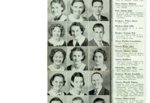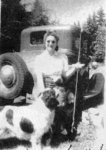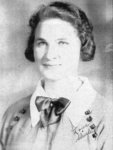



Last week, I wrote about the childhood of Shirley (French) Nelson of Chehalis. What follows is more of her story.
After living in the Mutual Logging Camp east of Tenino, the French family moved again to Tacoma in the mid-1930s, although Leslie French continued logging for Mutual, returning home to his family only on weekends.
Shirley’s mother, Ida, worked at F.S. Harmon and Company, a furniture factory that opened in Tacoma in 1882 and specialized in producing and selling Serta Sleeper mattresses throughout the Pacific Northwest. Shirley and her sister, Betty, attended J.P. Stewart School, where Shirley played saxophone, and later Lincoln High School, where she performed with the band and played oboe in the orchestra. She began to date and learned to drive.
Then the family moved again, this time to an unworked farm halfway between Bucoda and Centralia. The two girls rode the bus to Centralia High School, where Shirley was involved in Girls’ League, band and orchestra. Betty started dating Gordon Middlebusher, and Shirley hung out with Alvin Kellogg, a neighbor. They double dated, watching movies, strolling along the beach and walking on nearby Flumerfelt Road.
One night in October 1938, they were hosting the boys for dinner while their parents visited Rochester. As they listened to the radio, a voice burst across the Columbia Broadcasting System to report that Martians invaded New Jersey. Although actor Orson Wells was narrating H.G. Wells’ novel “The War of the Worlds” over the airwaves, his oration stirred fear and panic in America.
“It became so real, we expected to see these creatures walking over the mountains close by, coming after us,” Shirley said. “As I remember, I think I even tried calling mom — and that would have been a long-distance call.”
The family then moved to Centralia, where they ran a fruit stand on Harrison Avenue (near where the Goodwill sits today) and lived in the back of it.
After graduating from Centralia High School in 1938, Shirley had trouble finding a job, so she enrolled in postgraduate office practice classes at the high school.
In 1939, she started business college in Olympia. She lived with her Uncle Red and Aunt Babe and worked part time in their bakery and babysat to earn money for college.
“While attending school, I played hooky for the first time to go see the show ‘Gone With the Wind,’” she said.
She took a civil service test upstairs at the Chehalis Post Office and began dating Elton Lockwood, who asked her to marry him. She said yes.
Then she received a letter offering her a job as a stenographer in Washington, D.C. Her mother encouraged her to accept the position. Her Aunt Julia (Betts) Morris accompanied her on a train across the country to the nation’s capital as her husband, a longtime conductor for Northern Pacific Railroad, could obtain a free pass. Shirley found a room at the Taft house a few blocks from the White House. Her first room overlooked the sidewalk. She later moved to one with her own bathroom.
She reported to work as a clerk typist for the U.S. surgeon general in June 1941, where she was fingerprinted and swore allegiance. She usually rode a bus to work or at times walked home. While attending a program on the Capitol grounds with a friend, they sat on the grass and quickly learned about chigger bites.
“After much scratching and a trip to the pharmacy, we were informed how to get rid of them — and not to sit on the bare ground again,” she wrote in her memoirs.
The two signed up to become “G” girls, or Government Girls, which meant they rode a bus on weekends to Fort Belvoir in Fairfax, Virginia, to dance with the GIs. She received a letter from Elton, where he mentioned dating another girl.
“I really didn’t love the guy so sent his ring back and broke off our engagement,” she said. “Mom said he brought my letter down to them to read and she was proud of how I told him it was over.”
While dancing at Fort Belvoir, she met Joe Hebert, an Army G.I. from Louisiana. They dated, watched movies and enjoyed dinners. She recalled going to see a movie but running into a hubbub near the theater where First Lady Eleanor Roosevelt was promoting the March of Dimes, formerly the National Foundation of Infantile Paralysis, to combat polio.
One of her bosses, a captain, asked her for a date. When she accepted, he tried to “get fresh” with her. During their conversation, she discovered he was married. She later learned he invited all the new young ladies in the office on a date.
With her first paycheck, she bought a fur coat, which proved a wise decision the following winter. While living in the other Washington, she most missed the trees and nature of the rural areas where she grew up.
Then World War II broke out after the Japanese attack on Pearl Harbor in December 1941. Rationing of gas, butter (oleo with little yellow dye packages to make it look like butter), sugar and meat took effect. Men were drafted. Others fled to Canada to avoid military service.
“War speeds up things, and like I said, many marriages happened — not knowing when and if they would be sent overseas,” she wrote. “Joe asked me to marry him.”
Shirley’s parents visited to meet their prospective son-in-law. They traveled to New York City and stayed in a hotel where Benny Goodman and his orchestra were performing. Shirley roomed with her mother, Joe with her father.
“After dinner we decided to go to our rooms, and Benny Goodman and his manager rode in the same elevator as we did,” she recalled. “Benny acted as if he had been at the bar a few times.”
She and Joe Hebert married in Philadelphia before a justice of the peace and, after a weekend honeymoon, lived in a motel cabin until finding a house at Fort Belvoir. When Joe was deployed to Iceland, Shirley returned home to her parents, who lived on a farm outside Tenino with a Finnish bathhouse for steam baths. She later moved to an apartment above Garrison Drug Store in Centralia and worked in an abstract office. When her sister’s husband was deployed to the Philippines, Betty and their son, Duane, moved in with her.
Because of a back problem, Joe was medically discharged from an Army hospital in San Francisco. Then they moved in with her parents in Bucoda, where Betty, Gordon and Duane were also living.
Joe found a job on the green chain at Mutual Lumber, and Shirley worked in the office with Frank Barr and his assistant, Carol, who later became his wife. They bought a house and put their names on a waiting list for a refrigerator, making do with an ice box on the back porch. Appliances were in short supply as most manufacturing companies had focused on the war effort. They bought a Model A Ford coup.
When Centralia Plywood formed, Joe worked on the green chain and Shirly on the dry chain. Then she transferred into the office and worked under office manager Walter Wuerth and with Ralph Benton and Lorene LeFever. The mill manager was George Raknes.
The Heberts bought a house on Sixth Street in Centralia, sold their coup and bought a van to fix up for sleeping on long trips such as while hunting. They later swapped the van for a station wagon. But her husband’s hot temper and insanely jealous disposition left the marriage fraught with tension. Shirley filed for divorce after 15 years. They both still worked at Centralia Plywood. He remarried but died in April 1954 at the age of 54.
After the divorce, Shirley decided to fulfill her lifelong dream of visiting Hawaii — a woman alone in the 1950s. She learned to body surf, eat with chopsticks, play rock-paper-scissors and do hula dancing. She enjoyed a luau, visited the National Memorial Cemetery of the Pacific in the Punchbowl Crater, and fell in love with Hawaiian music.
“Looking back that many years ago, it was a brave thing to do — travel by myself and on a prop plane across that big ocean,” she wrote in her memoirs.
She returned home with her hair dyed and a permanent.
I’ll finish sharing Shirley’s story next week.
•••
Julie McDonald, a personal historian from Toledo, may be reached at memoirs@chaptersoflife.com.